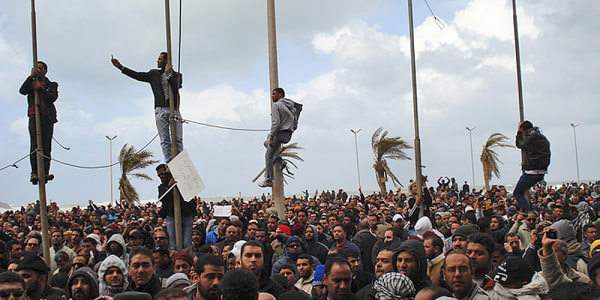Defense Secretary Robert Gates said on Thursday it should not be up to Washington to train and assist Libyan rebels or do nation-building after any fall of Moammar Gadhafi — jobs better left to others.
The comments by the outgoing defense chief, who is expected to retire this year, came during a day of tense testimony to Congress as lawmakers questioned whether the United States might deepen its involvement in Libya, where poorly organized rebels are struggling against better armed loyalist forces.
The top U.S. military officer, Adm. Mike Mullen, acknowledged in his testimony that the Libyan leader was not close to a military breaking point despite nearly two weeks of coalition air strikes.
Gadhafi's forces have used superior arms and tactics to push back rebels trying to edge westward along the coast from their stronghold of Benghazi toward the capital Tripoli.
Gates, a holdover from the Bush administration, agreed that rebel forces needed better training and organization but played down prospects the United States would directly assist them.
"In terms of providing that training, in terms of providing assistance to them, frankly, there are many countries that can do that," Gates said.
"That's not a unique capability for the United States. And, as far as I'm concerned, somebody else should do that."
The comments underscored the intensity of the debate in Washington about what to do next in Libya. The Obama administration had previously declined to rule out the possibility of arming the rebels.
Revelations that President Barack Obama has signed an order authorizing covert U.S. support for rebel forces fanned fears of "mission creep" among critics who warn the U.S. military is stretched by a decade of war.
"With Iraq and Afghanistan already occupying a considerable share of American resources, I sincerely hope that this is not the start of a third elongated conflict," said Republican Howard McKeon, chairman of the House of Representatives Armed Services Committee.
Mission creep
Gates stressed the limits of U.S. military action, saying no U.S. troops would deploy in Libya while he was in the job and that ousting Gadhafi was not part of the mission.
"I am preoccupied with avoiding mission creep and avoiding having an open-ended, very large-scale American commitment," Gates said.
He also played down any major U.S. role in a post-Gadhafi Libya, saying "the last thing this country needs is another enterprise in nation-building."
Slideshow 81 photos
Libya's uprising against Gadhafi
"My view is that the future of Libya — the United States ought not take responsibility for that, frankly," he said.
Mullen, chairman of the U.S. military's Joint Chiefs of Staff, said coalition strikes had taken a toll on Gadhafi's loyalists but he signaled a long struggle ahead.
"We have actually fairly seriously degraded his military capabilities ... We've attrited his overall forces at about the 20 to 25 percent level," Mullen said.
"That does not mean he's about to break from a military standpoint because that's not the case."
The rebels have said too much reliance on foreign military support would undermine their credibility and stressed they do not want foreign "boots on the ground." But they have appealed for arms to knock out Gadhafi's heavy weapons and tanks.
NATO formally took command of the coalition mission from the U.S. military earlier on Thursday, a milestone the Obama administration was keen to flag.
But Republican Senator John McCain, one of the strongest proponents of greater intervention in the North African country, criticized the U.S. military for transferring command "at a time when the Gadhafi forces have literally, tragically routed the anti-Gadhafi forces."
"The fact is that your timing is exquisite," McCain said.
He suggested that the U.S. is abandoning the campaign just as Gadhafi is regrouping and routing the opposition forces.
"For the United States to withdraw our unique offensive capabilities at this time would send the wrong signal," said McCain, top Republican on the Senate Armed Services panel. He said the U.S. must not fail in Libya and said he spoke as someone experienced in a lost conflict, a clear reference to his time as a prisoner of war in Vietnam.
Gates and Mullen acknowledged there was only limited U.S. intelligence on the rebels who might eventually take control of the oil-producing country.
"To be honest, other than a relative handful of leaders, we don't have much visibility into those who have risen against Gadhafi," Gates said, describing them as a "disparate" and "scattered" movement with competing agendas.
Mullen estimated there were only 1,000 militarily trained fighters.
Lawmakers complained Obama had not adequately consulted them before deciding to effectively launch an air war on Libya.
"This mission is unclear and the goals are unclear," said Rep. Michael Turner, a Republican. "If you placed a resolution on this floor today for a vote for approval ... I doubt that it would pass."
Gates, who has speculated about cracks within the Libyan government, predicted political and economic measures would pave the way for Gadhafi's ouster, over time, by his own people.
The White House, meanwhile, said arming the rebels is still under consideration, but press secretary Jay Carney said he saw "no contradiction" between that and Gates' remarks. He added, "what the president said is that he has not ruled it in or out."
As yet, none of Obama's top advisers have publicly advocated a significant expansion of the U.S. role aiding the opposition.
Separately, the State Department said the U.S. was not involved in the defection of Gadhafi's top diplomat, former Foreign Minister Moussa Koussa, although a U.S. diplomat had talked with Koussa.
"He's obviously been a part of the Gadhafi regime for many, many years," State Department spokesman Mark Toner said. "I obviously don't want to talk about what conversations we may be having with him and what kind of intelligence we may be able to gather from him, but he certainly has a wealth of information to share, should he decide to."
